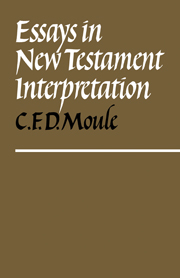Book contents
- Frontmatter
- Contents
- Foreword
- Acknowledgements
- Abbreviations
- Jesus in early Christian interpretation
- Studies in the Gospels
- 5 St Matthew: some neglected features
- 6 Neglected features in the problem of ‘the Son of Man’
- 7 The individualism of the Fourth Gospel
- Two studies in the Epistles
- Two linguistic studies
- Studies exegetical, doctrinal and ethical
- Index
5 - St Matthew: some neglected features
Published online by Cambridge University Press: 05 November 2011
- Frontmatter
- Contents
- Foreword
- Acknowledgements
- Abbreviations
- Jesus in early Christian interpretation
- Studies in the Gospels
- 5 St Matthew: some neglected features
- 6 Neglected features in the problem of ‘the Son of Man’
- 7 The individualism of the Fourth Gospel
- Two studies in the Epistles
- Two linguistic studies
- Studies exegetical, doctrinal and ethical
- Index
Summary
It is extremely interesting to watch different books of the New Testament coming successively into the forefront of research. There were the days of the so called ‘Marcan hypothesis’, when Mark was treated as the most important of all New Testament documents because it was deemed to lead us back, as no other document did, to the original Jesus. Then followed a period when the evangelists were, so to speak, shouldered out of the way in the attempt to see behind them and past them into the oral period before the traditions reached the shape which they assume in the Gospels. But more recently still has come a re-valuation of the work of the evangelists themselves, less for its historical importance than for the religious message they were themselves conveying. And so Mark came back into the foreground, no longer as a chronicler, but rather as a theologian; and there soon followed studies in the distinctive outlook and message of Luke-Acts. And now there are signs of considerable reawakening of interest in Matthew's message and meaning.
In view of this activity over Matthew, it would not be easy to find many, if any, totally neglected features. What I want to do, however, is to call attention to certain features which, although indeed noticed before, seem (to the best of my knowledge) to have been too lightly set aside or forgotten; and then to see whether a plausible account of the Gospel can be offered which will take them all into account.
- Type
- Chapter
- Information
- Essays in New Testament Interpretation , pp. 67 - 74Publisher: Cambridge University PressPrint publication year: 1982



